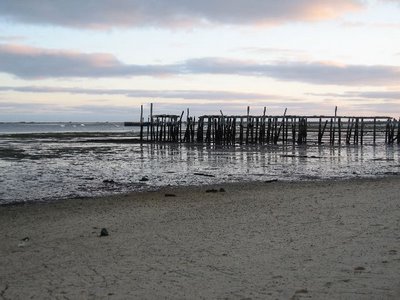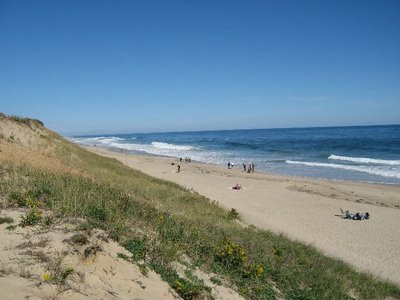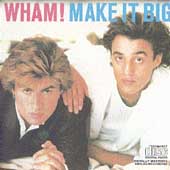A DREAM DETOURED

This house on my street has always reminded me of Cape Cod. Even after I actually went to Cape Cod and didn't see a single house like it, it still reminds me of Cape Cod. Maybe it's the way it looks sort of sand-scoured, sort of sea-touched. Maybe it's the saltbox appearance from the front. Or the way it sits on its dunelike hill against the porcelain sky, suggesting blue waves beyond. Maybe it's because no one seems to live there, like its fair-weather occupants have all fled inland for the winter. Or maybe it's the forlorn bar next to it, in a 19th-century stone house, that inspires the feel of a shabby beachtown at the end of the season. Or maybe it's my imagination.
Whatever it is, as I was walking past it, I got a terrible craving for clam chowder.
And a terrible yearning to own the house, to restore it to some imagined glory, to brace it against November's gales, to scrub it from stem to stern, to make its windows sparkle, to throw some dazzling white paint on the clapboards and pickets, and to stock it with firewood and wool blankets and kerosene lamps.
Alas, the only yearning I could actually satisfy was for the chowder — one more fantasy playing itself out in food, one more lofty craving of the mind reduced to a lowly craving of the stomach.
So I searched for a recipe online, one that would be good for Kansas (i.e., would not require fresh clams, which I assumed you couldn't even get here — but I was wrong about that), and I found this:
The Cliff House Clam Chowder from The Cliff House in Ogunquit, Maine
On the menu since 1872.
Serves six.
INGREDIENTS:
1 slice hickory-smoked bacon, minced
1/2 teaspoon butter
1 cup onion, minced
1 medium garlic clove, minced
1 teaspoon The Cliff House Spice Blend (see below)
1 tablespoon all-purpose flour
1 can clams (6-1/2 ounces)
1 cup bottled clam juice
1-1/2 cups Half and Half
1/4 teaspoon white pepper
2 medium potatoes, boiled, peeled and diced
PREPARATION:
To Create The Cliff House Spice Blend, blend 4 tsps oregano, 4 tsps dried parsley, 2 tsps marjoram, 2 tsps dill, 4 tsps thyme, 4 tsps basil, 1 tsp sage, 4 tsps rosemary, 2 tsps tarragon, 1 tablespoon all-purpose flour, crushing in a mortar if possible.
Store in a resealable plastic bag to refrigerate.
In a heavy-bottomed, 4-pint soup kettle, sauté bacon, butter, onion, garlic and The Cliff House Spice Blend over low heat. Do not allow to brown. Drain clams and set aside, reserving the juice. Slowly stir the flour and clam juices in the sauté mixture. Bring to a boil; reduce heat. Add Half and Half and simmer 20 minutes. Add white pepper, potatoes and clams. Heat to serving temperature. Do not allow to boil, as this toughens the clams. Serve at once with crackers and warm cornbread.
I was a little dubious about a recipe from Maine that called for canned clams. What gives? And when I saw that you could actually buy fresh Littleneck clams here, $6.99 a pound at the co-op, $5.99 a pound at Hy-Vee, I entertained making it from scratch. The from-scratch recipe I came up with called for white wine, which intrigued me, and EIGHT POUNDS of fresh Cherrystone clams. That's a lot of clams — literally and figuratively, $48 or $56 depending on where you shop. Not that I deny myself little luxuries here and there, but that seemed sort of extravagant for a meal for one to be eaten in my sweatpants on my couch while watching reruns of "Weeds." It would be like buying a really fancy hooker for the five-minute commute home. So I decided I'd save the fresh-clam experience for entertaining; it will be more fun to boil the little buggers and pry them from the shell and strain New England's sand from the nectar in the company of Kansas friends — fellow chowder virgins, as it were.
So canned clams it was. I bought two large cans of whole baby clams and two smaller cans of chopped clams because I couldn't decide which ones to use. I ended up using the chopped clams because the can size — 6-1/2 oz. — was what the recipe called for. Dumb reason, I know, especially because I ended up defying the recipe (a technique I learned from Christy) and using both 6-1/2 oz. cans. It just didn't seem clammy enough with one, and it would bug me to have three cans of clams just sitting in my pantry. Two, yes. But three would seem like hoarding.
Some other modifications to the recipe: I used vegetarian bacon (go ahead, laugh), more clam juice than it called for (on account of opening that extra can of clams), and a half cup more Half and Half than it called for (on account of not wanting that leftover half cup from the pint to just go bad in my refrigerator). The result of these liquid additions is that my chowder was probably thinner than it should have been. The chowder I ate in New England was so thick you could turn your spoon upside down and have hardly a drop fall off.
Here is a picture of my chowder. It was pretty hardy, despite the broth being a little thin, and it had a very nice flavor, which I attribute to my doubling the amount of herbs it called for. One teaspoon! Please. What do you take me for? I like a lot of herbs. Especially after journeying to the bulk spice store and buying nine different herbs and mixing up the famous spice blend, I wasn't about to call it good at one tiny teaspoon.
 (By the way, the color of dried dill is breathtaking ... I mean, I use it fairly regularly in egg salads and broiled fish and such, and it always takes me by surprise. It is utterly GREEN. It is Ireland green. You think the parsley is green, and the tarragon, then you open the dill, and it stops your heart.) So mixing up the herbs was probably the most fun part of this recipe, because of the colors and smells, and also because you can pretend you're a drug dealer putting together a fabulous bag of ganja. I should have departed from the recipe and wrapped the herbs in a garni. I think the chowder would be more beautiful with less debris floating in it. I also used black pepper instead of white pepper because I prefer its taste.
(By the way, the color of dried dill is breathtaking ... I mean, I use it fairly regularly in egg salads and broiled fish and such, and it always takes me by surprise. It is utterly GREEN. It is Ireland green. You think the parsley is green, and the tarragon, then you open the dill, and it stops your heart.) So mixing up the herbs was probably the most fun part of this recipe, because of the colors and smells, and also because you can pretend you're a drug dealer putting together a fabulous bag of ganja. I should have departed from the recipe and wrapped the herbs in a garni. I think the chowder would be more beautiful with less debris floating in it. I also used black pepper instead of white pepper because I prefer its taste.The canned clams were a little too chewy — I'm willing to give the fresh ones a try — but, I have to say, my first chowder satisfied my craving quite nicely, although I'm still hungry for that fabulous house.


















